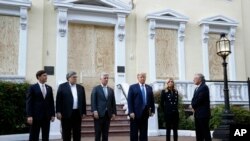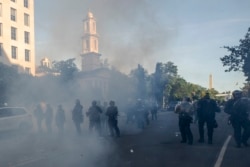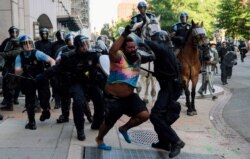U.S. Attorney General William Barr on Thursday defended his decision to order the removal earlier this week of demonstrators near the White House, saying the move was necessary to protect the building and federal personnel against increasingly belligerent protesters.
But Barr, who is directing the federal response to the protests over African American George Floyd’s death, denied his directive to disperse the crowd on Monday afternoon was tied to President Donald Trump’s controversial visit for a photo op to a church across the street from the White House, saying he acted before learning about Trump’s plan that day.
The move led law enforcement officers protecting the White House to use pepper balls, smoke canisters, riot shields and batons to push back a crowd of several hundred protesters, sparking a national outcry over excessive use of force against largely peaceful demonstrators.
With the crowd cleared, Trump, accompanied by Barr, Defense Secretary Mark Esper and several other senior administration officials, crossed the street to the historic St. John’s Church where the president posed for a photograph holding up a Bible.
The highly unusual visit came several days after Trump was reportedly taken to the White House underground bunker as the protests outside the White House intensified.
Trump has said he went to the bunker only to inspect it. Critics say the Monday afternoon photo op was designed to show a president taking bold action to counter the image of Trump seeking shelter in the bunker.
The attorney general's prominent role in directing law enforcement personnel from agencies outside the Justice Department – such as the Secret Service, which operates under the Department of Homeland Security – is unprecedented in recent memory. Asked about his expanded authority, Barr said he was asked by Trump on Monday to "coordinate" the various federal agencies' response to the protests.
But Barr insisted that there was no “correlation” between his directive to remove the protesters and Trump’s subsequent visit to the church, which had suffered some fire damage in the basement the night before. Instead, he said, the move was designed to create a "buffer" to protect the White House and Secret Service agents who could be targeted by projectiles thrown by protesters.
“I made the decision that we’d try to move our perimeter northward by a block to provide this additional protection,” he said.
In doing so, Barr deployed secret service agents, park police, guards brought in from the Federal Bureau of Prisons, helicopter flyovers and other tactical personnel. One Justice Department official told The Washington Post that Barr’s strategy was to “flood the zone” by putting “the maximum amount of law enforcement out on the street.”
The forcible removal of peaceful protesters so Trump could have a photo op was widely condemned. Trump’s former defense secretary, Jim Mattis, issued a rare statement on Wednesday denouncing the action and accusing Trump of dividing the nation.
While Esper has sought to distance himself from the episode, Barr said it was “appropriate” for him and other officials to follow Trump to the church.
Protests and violent demonstrations broke out in Washington and across the country after Floyd died while in police custody in Minneapolis on May 25, after one of the police officers pressed his knee on Floyd’s neck for nearly nine minutes. On Wednesday, Minnesota prosecutors charged one police officer with second-degree murder in connection with Floyd’s death and three others with aiding and abetting.
With Washington police overwhelmed by demonstrators, several thousand National Guard troops have moved into the nation’s capital to patrol the streets. To restore order in Washington, Barr said he directed the deployment of personnel from all components of the Justice Department – from the Bureau of Prisons to the Drug Enforcement Agency to the Alcohol, Tobacco, Firearms and Explosives agency.
Barr’s outsized role in directing law enforcement personnel against protesters has drawn criticism from Democrats as well as some veterans of the Justice Department.
“No lawyer should ever have operational responsibility for law enforcement,” said Paul Rosenzweig, a former Justice Department official now with the libertarian R Street Institute in Washington.
The muscular show of military and law enforcement force also has caused tensions between the federal government and the city of Washington where officials have pushed back against efforts to dispatch active military personnel to the city and to take over the city police force during the unrest.
But Barr defended the federal government’s response, saying the demonstrators had grown increasingly belligerent in the lead-up to the events Monday, threatening federal property and personnel.
A Treasury Department annex was broken into, a federal building near the White House was burned down, and a fire was started at St. John’s Church across the street from the White House, he said. Between Saturday and Thursday, he said, 114 law enforcement officers sustained injuries during the protests in Washington, with at least 22 hospitalized with serious head injuries.
“It was very serious rioting,” he said.
But Barr, who has been making nightly rounds of checkpoints around the city, said violence has dropped substantially since Monday and that the lasts two nights have been "peaceful."
“After assessing the situation last night … I felt that we could afford to take a collapse our perimeter and eliminate some of the checkpoints and so forth and take a little bit of a low profile footprint,” Barr said.
That is in line with the assessment of Washington police. Washington officials announced Thursday that they’ll lift a nightly curfew after Wednesday's gathering of more than 5,000 protesters, the largest in recent days, resulted in no arrests.
The Justice Department's response to the protests has not been limited to Washington.
Accusing extremist groups of all stripes of seeking to exploit the protests and fomenting violence, federal authorities have stepped up arresting and charging individuals accused of rioting.
Barr said 51 people have been arrested in recent days for federal crimes in connection with rioting, adding that the department has evidence that the anti-fascist movement known as antifa and extremist groups have sought to exploit the protests for political ends.
On Wednesday, federal prosecutors in Nevada charged three alleged members of the extremist Boogaloo movement with conspiracy to cause destruction during protests in Las Vegas and possession of a Molotov cocktail.






